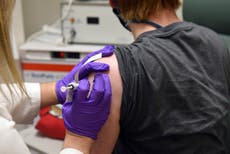FDA panel faces dilemma of what happens to placebo trial volunteers ahead of Pfizer vaccine vote
The Vaccines and Related Biological Products Advisory Committee is meeting to discuss if Pfizer should be issued emergency authorisation for its vaccine
An ethical dilemma about what would happen to coronavirus vaccine trial volunteers who received the placebo was raised during the Food and Drug Administration’s (FDA) panel to discuss if Pfizer should receive emergency use authorization.
Companies like Pfizer created human vaccine trials earlier this year that were randomised, double-blinded, and placebo-controlled – meaning some participants received a placebo vaccine versus the actual coronavirus vaccine formula.
Pfizer indicated it would want to give their placebo recipients the coronavirus vaccine if the company was to receive emergency use authorisation from the FDA.
But this has caused an ethical dilemma among experts, given the FDA would like placebo-generated trials to continue for as long as possible to better determine the efficacy of the coronavirus vaccines being tested.
The dilemma was brought up during Thursday’s meeting of the Vaccines and Related Biological Products Advisory Committee, an independent panel gathered by the FDA to vote on if they would support the emergency use authorisation for Pfizer’s coronavirus vaccine.
When people signed up for Pfizer’s vaccine trial, they were told it would last for two years and they would not know if they received the coronavirus vaccine or placebo. But, according to one trial participant speaking on condition of anonymity to The Independent, the contract did not state they would remain “blinded” for the full two years – leaving the door open for Pfizer to tell participants their vaccine status pending research results.
Experts warned an emergency use authorisation of Pfizer’s vaccine, if proven to be safe and effective, could leave some of the trial volunteers unprotected. Additionally, participants who believed they received the placebo could decide to drop out of the trial so they could receive the actual vaccine – which would impact data.
Dr Steven Goodman, an associate dean and professor of medicine at the Stanford University School of Medicine, urged the group during Thursday’s meeting to change the trial design to avoid potential issues.
Ethically, Dr Goodman said, companies were not required give trial participants the coronavirus vaccine if they received the placebo version, but this could cause significant drops in enrolment. On the other hand, giving trial participants the coronavirus vaccine once it receives emergency use authorisation would allow some relatively young and healthy volunteers to jump ahead of an older person at high risk of serious Covid-19 disease.
He instead proposed to vaccinate placebo trial participants but keep them “blinded” throughout the process.
This would work by each company first determining when a trial volunteer would receive a coronavirus vaccine based on their location, age, job, and health status – like the rest of the American public. Once it was their turn in line, the placebo volunteer candidates would receive the actual coronavirus vaccine and those who received the coronavirus vaccine would receive a placebo version.
None of the trial volunteers would be informed about their original vaccine status, but they would be assured they all received the vaccine.
Dr Goodman recommended allowing young and healthy volunteers to receive the vaccine ahead of others in America like them, which would give people incentive to remain in the trials and reward them for participating in scientific research.
This “deferred randomisation” design, he said, would result in some loss of data, but it would allow for companies to gather long-term data on issues like the durability of immune response generated by the vaccine and if the vaccinated could transmit the novel virus to others.
The independent panel of experts will vote later on Thursday on if they think the FDA should issues emergency use authorisation to Pfizer for its coronavirus vaccine.



Join our commenting forum
Join thought-provoking conversations, follow other Independent readers and see their replies
Comments